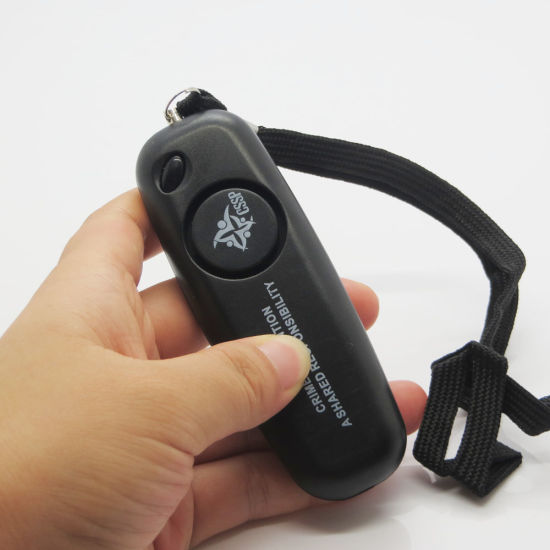
A few things are important to remember before purchasing a personal security alarm. You may require a louder sound than a human voice depending on your circumstances. While some personal safety alarms produce noise at about 115 dB, you need one that can reach 120 dB. Loud noise is a good deterrent for robbers and attackers, and it might even scare away coyotes. You should also make it easy for the alarm to be activated so it doesn’t disrupt meetings or scare away customers from crowded restaurants.
Personal safety alarms cost
You can choose from a range of personal safety alarms with different prices and features. Some have only a whistle, others have flashlights, built-in whistles, and many other features. Personal safety alarms can be priced anywhere from $8 to 25 depending on the brand. Low-end personal security alarms require a button, pin mechanism or button to activate. Personal safety alarms in the middle range cost between $12 and $25, and come usually with a flashlight.

Price of keychain style devices
If you're on a tight budget, you may be tempted to buy a sub-$50 keychain-style personal safety alarm. But you need to know the features and benefits these devices offer. For starters, they should be small enough to fit in your hand, not too loud, and disguised as jewelry. Although most personal safety alarms made from keychains last at least one year, it is important to regularly check the batteries.
Loudness to 130 dB Alarms
A personal safety alarm can be an effective deterrent against theft. This alarm is a great way to alert others about an imminent attack. Personal alarms can be heard at 130 dB and are effective in scaring off any potential attackers. These devices are suitable for both adults AND children. They can be carried in a small pocket or bag. For men, a personal alarm is not appropriate.
Cost of button activated devices
Personal safety alarms are activated by pushing a button or pulling a bolt/ring. Button-activated gadgets are similar to car key fobs. Users simply need to push a button or pull out a bolt or rings. Although both are effective, the button activated model can be more costly. It's crucial to be familiar with the particular features and costs of each type of button-activated personal emergency alarm before buying one.

Preferences for personal security alarms
There are many differences between personal safety alarms used in hospitals and those in private homes. Personal alarms that use whistles or screams to disarm an offender are not as effective as those that use coded and silent sounds. While panic buttons are recommended for hospitals as well, no research has been done to verify their effectiveness. Ultimately, the preference of a nurse for personal safety alarms depends on the setting in which they are used.
FAQ
What are some easy self-defense moves?
Self-defense techniques include punches. Kicks. elbows. knees. and other strikes. You may also be able to use grappling techniques such as wrestling, judo and jujitsu or karate, taekwondo and karate.
Protect yourself from an attacker who is trying to hurt your feelings with self-defense tactics
They can also serve to defend yourself against someone who is attacking you.
There are many ways you can practice self-defense. Decide which one is best for you.
What are the benefits from martial arts training
Martial arts training helps you develop skills you can use in any situation. They help you become stronger and faster. They teach you how deal with various types of attacks.
They can also increase your confidence. When you feel safe, you tend to be more relaxed and less stressed.
They are also good for your health. Research shows that exercise can improve your overall health.
How do beginners do self-defense?
Self-defense does not require that you have been trained by an expert. You must also be able to defend yourself alone. To protect yourself against an attack, you should know the basics.
Start with simple moves such as punching, kicks, and kneeing. Then you can add more advanced moves like grappling and joint locks.
It is always beneficial to practice what you might encounter in real-life situations. You can use a pillow to practice how to kick someone.
This way, you won't hurt yourself while practicing. Be careful not to strike anything too hard as you could cause damage.
How much does it set you back to take a self defence course?
There are many self-defense courses available. The price of self-defense classes varies depending on where they are held and whether they are taken in person or electronically.
Some schools charge $50 per month while others charge as high as $200.
You can find a low-cost option at your local community center. Many of these locations offer free self defence lessons.
What are some self-defense tips for women?
Self-defense is about being able to respond quickly. This means that you should be prepared for anything.
Train with friends is one of your best options. Having a partner will allow you to practice together and work on your technique.
Another tip is that you should practice with something heavier. If you're attacked, you're more likely to strike your attacker harder if the object you are holding is heavy.
What is the most effective method of self-defense?
Avoiding attack is the best defense. When you are attacked, it is best to flee as fast and as possible. This will allow you to come up with a better defense strategy.
If you can't escape, you can use the defensive strategies you have learned. These include punches or kicks as well as knees. You can also grab your attacker’s arms or legs to stop him attacking you further.
If none of these options works, you will need to fight back with all the available tools. The best weapon to use for this purpose are your naked hands. If you don't know the proper way to use them, then you should start learning other forms of self-defense.
Statistics
- Most likely, you'll get tapped out by 90% of the people in your first 3-5 months. (mmaclan.com)
- Verbal harassment was the most common form, but 51 percent of women said they were touched or groped in an unwelcome way, while 27 percent of women survived sexual assault. (healthline.com)
- The Rape, Abuse & Incest National Network reports that 70 percent of sexual violence cases aren't committed by random strangers in a dark alley but by people we know: friends, family, partners, co-workers, etc. (healthline.com)
- Some people walk into a gym thinking they are going to become the best by training whenever they like and not putting 100% effort in. (budodragon.com)
External Links
How To
How to Survive a Home Invasion
Home invasion is a scary thought, especially when there are kids involved. We didn’t know that we would be experiencing it ourselves as we embarked on our home security system installation adventure. Here's what we've discovered so far.
-
Don't Let Your Kids See The Attackers. Two men broke into our home upstairs while our kids were sleeping. We took them downstairs until they arrived at the police station. Although our children weren't injured, they were traumatized enough.
-
Lock All Valuables. We keep valuables locked up in a safe in our bedroom. Even if someone breaks in to the house, they won’t even be able get it.
-
Keep an Eye out for Burglars. We live in an area that is prone to burglaries. We keep a look out for suspicious people and cars.
-
Have A Backup Plan. Our family will be financially protected in case anything happens. We also have a plan in place to leave the country if necessary.
-
Be prepared. Prepare for anything. You should always have water and food on hand.
-
Call 911 immediately. Call 911 immediately after finding out someone is breaking into your house. It's safer to call the authorities immediately than to wait for them at your door.
-
Use common sense. Do not let anyone enter your home if you don't feel at home. Do not invite strangers.
-
You can get help from nearby neighbors and people who live in the same area. If you feel unsafe call neighbors and friends. They will be able to watch your back and call the police.
-
Keep your cool and do as instructed by officers. Stay calm and do exactly as instructed by officers. Do not flee or resist arrest
-
Take Pictures Of Any Evidence. Take pictures of any evidence found during the investigation. This includes fingerprints, blood samples and other items.
-
Local Law Enforcement Should Be contacted. Even if you are not the victim, it is a good idea to file a report with local law enforcement. This could help prevent you from being convicted of future crimes.
-
Contact your Insurance Company immediately. Contact your insurance company right away. You can tell them all about what happened and they will send an adjuster out to assess the damage.
-
Retire Personal Belongings. Before you leave the scene, remove personal belongings. It is best to take your expensive jewelry off and place it somewhere safe.
-
Take Care of Yourself. Keep your surroundings clean. Clear away trash and broken glass. Make sure that all doors and windows are securely locked.
-
Don't talk about the events. Don't talk about anyone's past. It is possible that someone might use the information against you.